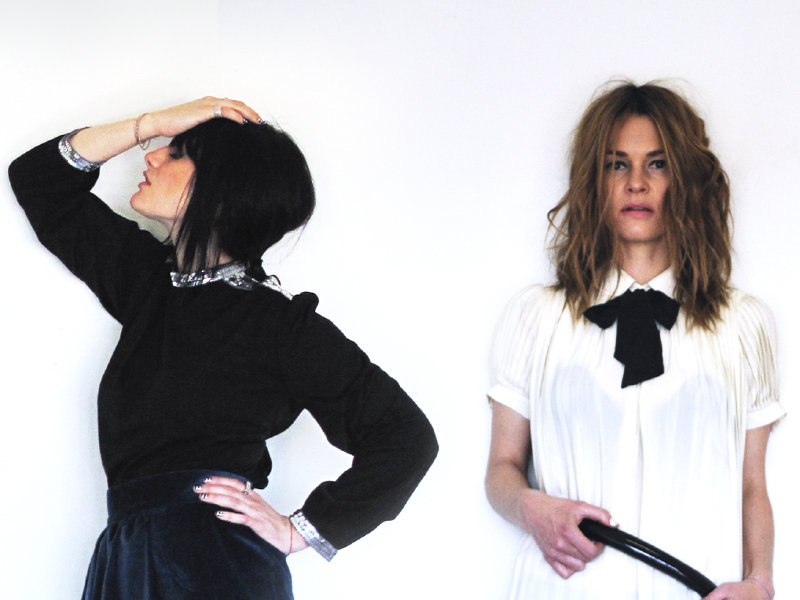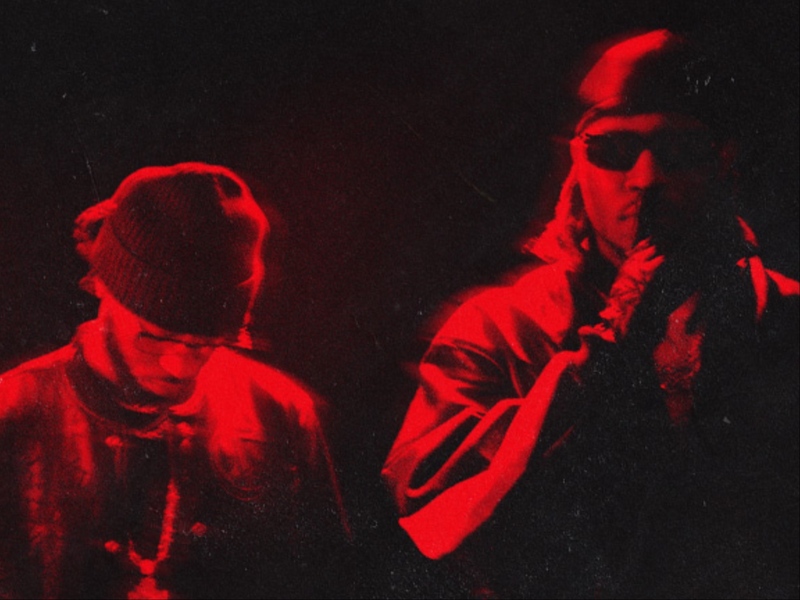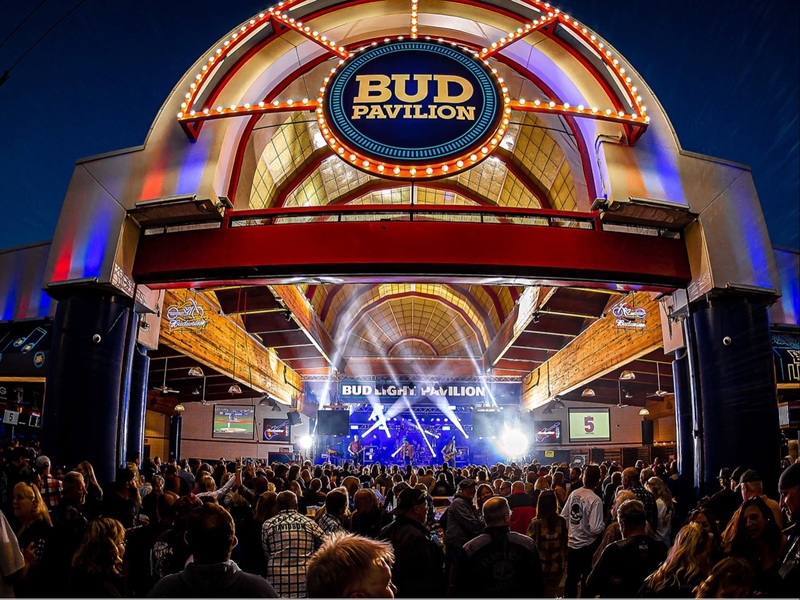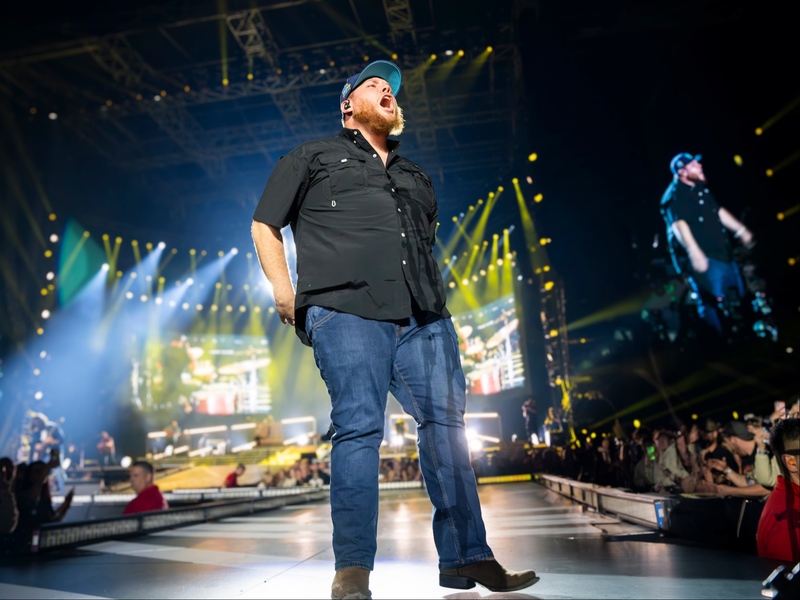With bands like CHVRCHES and Ellie Goulding making it big, and Top 40 radio getting thoroughly infiltrated by electronic artists of all shapes and sizes, it would appear that electropop is having a moment. So after trying out a more rock-hued sound for an EP or two, what better time for Uh Huh Her to go back to their electropop roots? That would likely be a label's advice for the band ... that is, if Uh Huh Her was attached a label.
Named after PJ Harvey's 2004 album, the L.A.-based duo of Camila Grey and Leisha Hailey (who some may recognize from her acting work on Showtime's "The L Word" as Alice or in a popular set of Yoplait ads) work independent of a label, but that's been no problem so far.
They've been touring the nation – including a stop Monday night at Turner Hall Ballroom – drawing crowds and building an audience, all without a record label breathing down one's back and with creative and financial freedom. A part of that freedom involved coming back to the duo's electropop origins for its latest album, "Future Souls."
Before she takes the Turner Hall stage Monday night, OnMilwaukee.com got a chance to ask Grey, the band's lead singer and guitarist, some questions about topics big – existential topics, why are we here – and small, like her secret storm chasing ambitions.
OnMilwaukee.com: How did you and Leisha come together and form Uh Huh Her?
Camila Grey: We basically met in Los Angeles through mutual friends. I was in a band called Mellowdrone, and she was wanting to get back into music. She saw me with that band out in L.A., and coincidentally after she saw us play, we were dropped by Sony so I was kind of in the market to do something else musically speaking. So we got together, and six months later, we were signed. It was pretty fast (laughs).
OMC: You recently moved your studio into your home. What was the motivation behind that?
CG: I feel like once you’ve been independent for a couple of years – we’ve been independent from record labels since 2009-10 – you learn how to deal with financials and all that kind of stuff. So we were like, well, we’ve already been operating a studio but we were renting a space. We figured it would save us a lot of money to get a house and put it in there instead of paying exorbitant amounts of rent every month.
So we moved it there just for the intention of being able to lackadaisically create whenever we wanted to and not have the pressure of having to go elsewhere for their services and having to pay people. I’m an engineer and I produce, so it just seemed like the smartest, logistical thing to do.
OMC: So do you wake up in the middle of the night with a brilliant idea and head over to the studio?
CG: (laughs) Sometimes I do. I wake up with songs in my head, so I’ll record me humming this little thing. Then the next morning, I’ll wake up and be like, "Whoa, I have no recollection of that." (laughs)
OMC: What’s it like working without the pressures of a label and the demands that it implies?
CG: Yeah, it’s definitely a double-edged sword. There are certain benefits that we missed, and there’s a team kind of happening at labels that gets sh*t done, if you know what I mean. (laughs) Whereas we really need to rally and kick our own selves in the butt every time we need to get something done because we don’t have ten people doing it for us.
In the same sense, we know where everything is going. We know every dime that comes in, and we now every dime that goes out. We’re very aware of what it takes to get stuff done. When you’re signed, labels often give you the luxury of people doing stuff for you, but more often that not, those luxuries are very costly, and you’re so unaware of that. Suddenly a year later, you’re asking why you’re $150,000 in debt.
That part of it I really appreciate it and have learned so much. I love that we’re business-minded enough and still have a chance to be creative too. That’s the hard part; sometimes you’re so business that you’re like, "Oh f*ck! Why am I not writing songs anymore!?" Like I said, a double-edged sword.
OMC: You started touring recently. How’s it been on the road?
CG: Yeah, we’ve been on the road about a week now. It’s actually been a week to the day. We’re in Iowa right now. We’ve been going through the craziest weather. That’s always the thing in spring when you tour, you go through the nuttiest weather with tornados all around you, especially in the Midwest. That’s been really exciting because I secretly probably wish I was a storm chaser.
OMC: Really?
CG: Yeah, I have all these tornado apps and stuff about the weather. I have my tornado app, and it’s like constantly going off and I’m like, "There’s nothing going on; it’s so annoying!" (laughs)
OMC: You released your third full-length album this year, "Future Souls." What was the process and inspirations behind that album?
CG: I think the inspiration would be getting back to our roots of electronic based music. For a minute there, we were kind of rocking out in a climate that really doesn’t, I don’t think, appreciate rock music. Everything’s either electronic or dub or this or that. Everyone’s in an indie electronic band, and we were doing it when it wasn’t that popular in like 2006 and 2007.
I think we wanted to get back to that glossy, sense-based beat because I kind of missed it. "Black and Blue," the EP we made, that was kind of the vibe we wanted to get back to. I was listening to a lot of electronic music, like The Knife, and I wanted to test those waters again.
OMC: This album has a real philosophical and existential bent to it. Where did that kind of lyrical angle come from?
CG: Oh man, that’s my daily existence. From the time when I was a child, my parents were like, "Why can’t you just chill?!" (laughs) I’ve always questioned everything. I grew up in a kind of very religious-based household in the middle of a small town in Texas, so I was always having to think outside of the box because if I didn’t, I would suffocate and die.
Those things kind of ail me daily. I’m constantly like, "What the hell is going on, man? Where are we? When are the aliens going to come down and show themselves?" (laughs) I don’t know; that’s kind of where I’m always at. Those questions are kind of a constant for me, and the older I get, the more perturbed I become. And the more I read, the more perturbed I become, so I felt like I finally wanted to address that in song.
OMC: Are there any philosophical or existential writers in particular that really inspire you?
CG: Well I’m a big Richard Dawkins fan. I love Stephen Hawking. Anything that has anything to do with statistical, scientific analysis, I love. I think we live in a world where either things are based on fact or theorized fact, or you’re just going on faith. And to me, that’s just the craziest thing ever. I like hard facts, I’m just one of those people. At the same time, I also have this very spiritualistic view on things too, where that kind of stuff could be possible. It’s always this battle that I’m having between statistical facts and that spiritual existence that a lot of people grab onto as well.
OMC: Yeah, there’s the scientific side of those big questions, but also the faith or spiritual side of those questions, the more personal side.
CG: Yeah, it’s a really interesting question that you have to ask: Why?
As much as it is a gigantic cliché to say that one has always had a passion for film, Matt Mueller has always had a passion for film. Whether it was bringing in the latest movie reviews for his first grade show-and-tell or writing film reviews for the St. Norbert College Times as a high school student, Matt is way too obsessed with movies for his own good.
When he's not writing about the latest blockbuster or talking much too glowingly about "Piranha 3D," Matt can probably be found watching literally any sport (minus cricket) or working at - get this - a local movie theater. Or watching a movie. Yeah, he's probably watching a movie.







